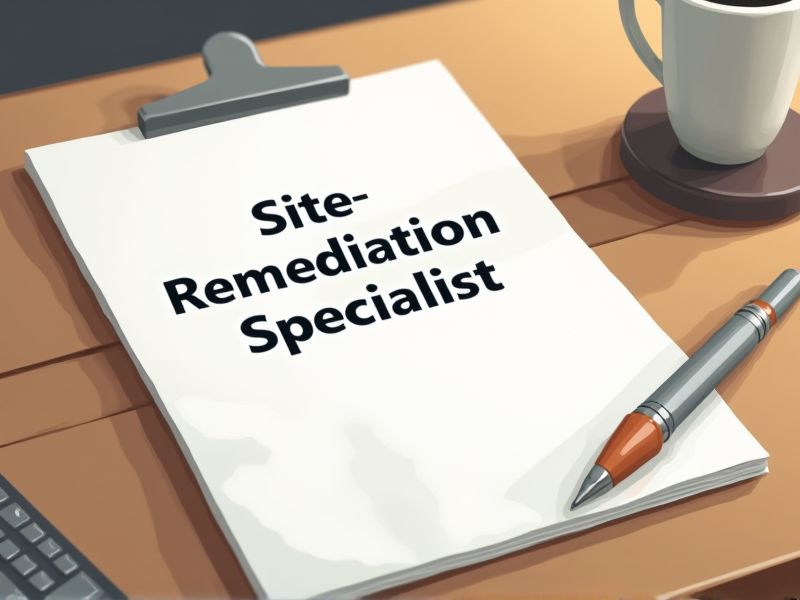
Site Remediation Specialists handle complex environmental challenges that demand a high standard of expertise, making certifications essential for ensuring adequate knowledge and skills. Regulatory compliance is often a crucial aspect of site remediation, necessitating professionals to have updated and specific qualifications. Certified specialists gain the trust of stakeholders by demonstrating their capability to safely and efficiently manage contaminated sites. Here are some critical certifications required for Site Remediation Specialists.
Hazardous Waste Operations and Emergency Response (HAZWOPER) Training Certification
HAZWOPER Training Certification ensures that site remediation specialists are equipped with the knowledge to handle hazardous substances safely, reducing the risk of contamination and exposure. Regulatory compliance is required by OSHA for workers dealing with hazardous waste, and certification demonstrates adherence to these legal mandates. The training prepares specialists for emergency response situations, which can occur unpredictably during site cleanup projects. Certification fosters a safer working environment by promoting best practices in managing dangerous materials effectively.
Certified Environmental Professional (CEP)
Certified Environmental Professionals (CEP) bring a validated level of expertise and knowledge critical for navigating complex environmental regulations during site remediation efforts. Their certification ensures that remediation projects meet strict legal and environmental standards, reducing potential liabilities. With specialized training, CEPs can identify potential hazards and implement effective cleanup strategies efficiently. Hiring a CEP enhances the credibility and accuracy of environmental assessments, ultimately leading to more successful and sustainable project outcomes.
Certified Industrial Hygienist (CIH)
Certified Industrial Hygienists (CIH) are essential for site remediation specialists due to their expertise in hazard identification and risk assessment, ensuring safety and compliance during cleanup processes. Their advanced knowledge in industrial hygiene principles helps in developing effective strategies to control exposure to harmful substances, reducing health risks. The CIH's proficiency in regulatory compliance ensures that site remediation activities adhere to local, state, and federal guidelines, avoiding potential legal and financial repercussions. The CIH team's skills in air and environmental sampling provide accurate data to guide the remediation efforts and confirm the site's safety post-cleanup.
Certified Site Remediation Specialist (CSRS)
A Certified Site Remediation Specialist (CSRS) ensures adherence to environmental regulations during site cleanup, reducing the risk of legal issues. With specific training and certification, a CSRS can effectively address complex contamination issues, offering more reliable remediation outcomes. Their expertise often leads to more efficient remediation processes, minimizing downtime and costs for site owners. Utilizing a CSRS provides assurance of best practices in environmental management, maintaining both ecological and human health.
Environmental Site Assessment (ESA) Certification
Possessing an Environmental Site Assessment (ESA) Certification equips a Site Remediation Specialist with the necessary expertise to identify potential environmental hazards before remediation. This certification ensures adherence to regulatory compliance, thus minimizing legal risks associated with environmental liabilities. It guides specialists in applying the appropriate techniques and best practices in assessing and addressing contamination effectively. Incident prevention and mitigation are enhanced due to the certification's focus on thorough risk assessment and on-site evaluation procedures.
Registered Environmental Manager (REM)
A Registered Environmental Manager (REM) provides expertise in assessing environmental risks, essential for effective site remediation. Their knowledge in regulatory compliance ensures that remediation processes adhere to legal standards, minimizing potential liabilities. Their experience in project management helps coordinate complex remediation efforts, leading to efficient resource allocation and timely project completion. With their ability to interpret environmental data accurately, REMs offer critical insights for sustainable and successful site restoration strategies.
Certified Hazardous Materials Manager (CHMM)
The presence of a Certified Hazardous Materials Manager ensures expertise in safely handling and mitigating hazardous substances at a remediation site. Certified knowledge contributes to compliance with environmental regulations, reducing the risk of legal penalties. Expertise in risk assessment and management prevents health hazards to workers and surrounding communities. Proper hazardous materials management optimizes remediation strategies, saving time and resources in the long run.
Project Management Professional (PMP)
Project Management Professional (PMP) certification equips a site remediation specialist with standardized methodologies and best practices, enhancing project efficiency and effectiveness. These tools ensure that time, cost, and resources are optimally managed, crucial for complex remediation projects. Improved communication and stakeholder management skills from PMP training lead to more cohesive team collaboration and client satisfaction. Moreover, possessing a PMP certification often enhances credibility and increases career advancement opportunities in a competitive field.
OSHA 30-Hour Construction and Site Safety Certification
OSHA 30-Hour Construction and Site Safety Certification is needed for a Site Remediation Specialist because it equips them with the essential knowledge to identify and mitigate potential hazards on construction sites. This certification enhances their understanding of safety standards and best practices, minimizing the risk of accidents and improving site safety. Knowledge gained from the certification enables specialists to comply with federal safety regulations, which is crucial for legal and operational integrity. The certification also boosts the specialist's credibility and employability in the construction and remediation industry.
American Academy of Environmental Engineers & Scientists (AAEES) Certification
AAEES Certification ensures that a Site Remediation Specialist possesses the necessary expertise in environmental and scientific principles crucial for effectively cleaning and restoring contaminated sites. Certified specialists are likely to adhere to higher professional and ethical standards, ensuring the safety and health of the public and the environment. Regulatory bodies and clients often trust certified professionals more, which can streamline project approvals and facilitate smoother collaboration. Certification can also provide a competitive advantage in the job market, as employers frequently seek candidates with verified credentials.
Summary
Upon obtaining certifications, you can expect enhanced credibility and professional recognition as a Site Remediation Specialist. Certified knowledge often leads to improved job performance and efficiency in your projects. Employers may also view you as a more competitive candidate for advanced positions, leading to potential career growth. Certifications can expand your network within the industry, offering new opportunities and resources.
